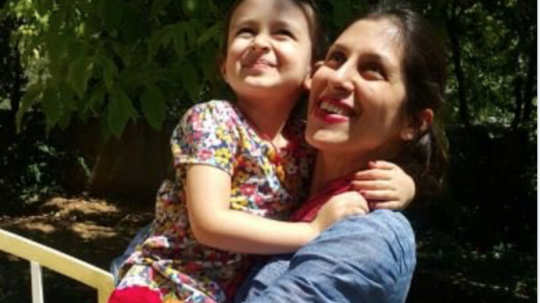
Aaron: I'm here today with Richard Ratcliffe, who's been campaigning for the release of his wife Nazanin Zaghari-Ratcliffe since she was arrested while visiting family in Iran four years ago. In 2016, Nazanin was convicted of membership of an illegal group in a trial which Amnesty International has described as deeply unfair. There's now hope that Nazanin may be released. How are you doing, Richard?
Richard Ratcliffe: Hi, yeah, good. I mean as you say it's a slightly more positive moment than lots of the campaign has had.
Aaron: What steps do you think can be taken at an international level to help people that are caught in a situation like Nazanin's?
Richard Ratcliffe: I think there does need to be domestically something like almost like a bill of rights for consular protection. So if you get arrested overseas, what can we expect government to actually do?
Aaron: Can you describe what you do in 10 words or less?
Richard Ratcliffe: Well, so my day job is an accountant, but mainly these days, I campaign for my wife, Nazanin Ratcliffe to bring her home.
Aaron: What would you say was the most important lesson you learned while growing up?
Richard Ratcliffe: I think probably from the past few years the importance of kindness. I think, a lot of campaigning I thought was about you know, speaking with a loud voice, asserting your point, getting people to hear you. But actually, it's the value of people caring and being kind and just reaching out and connecting and sharing.
Aaron: And what advice would you give to a 10-year-old you?
Richard Ratcliffe: I think our lives have taken some very strange directions and unexpected directions. I think just being honest with yourself, and being honest with others, and being respectful of others.
Aaron: Who would play you in a movie of your life?
Richard Ratcliffe: There is a play about Nazanin that has done a round and someone came up to us and mocked the fact that the guy who played me happened to be a lot thinner, a lot better looking and a lot taller. I would hope the same would be true in the film.
Aaron: What would you say that you're most proud of?
Richard Ratcliffe: For me, it was really important that she didn't feel alone, and that she felt that people cared for her. One of the nice things about being out of prison briefly, is she would read some of the cards that people have sent through Amnesty campaigns. All that lovely care, person to ordinary person, boy, does it matter in this situation. So I think I'm proud of having been part of that.
Aaron: This is one of our kind of staple questions, and I can perhaps anticipate the answer, if there's anything you'd like to achieve which you haven't yet?
Richard Ratcliffe: So there's literally getting on a plane and coming back but then the journey back to normal takes some time. You know, this is a tough experience at the moment. It defines us at the moment. There will come a point I hope when it doesn't.
Aaron: If you could immediately put right one injustice in the UK right now, which would it be and why?
Richard Ratcliffe: At the moment cases like ours, specifically ours, get quite a lot of attention because it's quite dramatic, because I'm able to get on Radio 4 and talk about it. There are plenty of people that are going through similar things but speak with an accent, who don't have the same sort of economic base when they can just go to the states to lobby, is profoundly unfair, like profoundly unfair. And I think the fact that there is no level playing field, I think that's a much bigger injustice than people realise.
Aaron: And is there a human right which is most important to you and why?
Richard Ratcliffe: Human rights on some level is pragmatic and minimalist. What's the bare minimum we all need to have a society we can all live with? Well, protection from torture has to be it.
Aaron: That moves us on to the last question, which is if you have any ideas for what can be done to heal divisions within society right now?
Richard Ratcliffe: There are always going to be disputes between people and in society. There are things that are uneven an unfair, and there will be arguments for how to do it and how much should be changed. Where people are honest and empathetic of each other's perspectives you can always find a way through. Where people are busy triggering each other and trying to provoke each other you're much less likely to find that. But there's the power of just saying I see you, I really see you. It's almost the most important thing anyone can ever do.
Aaron: It takes an enormous amount of empathy dealing with extraordinary circumstances you're in, I think, to come round to that and I think that's really interesting and I thank you so much for your time.
Richard Ratcliffe: Thanks Aaron, cheers.


